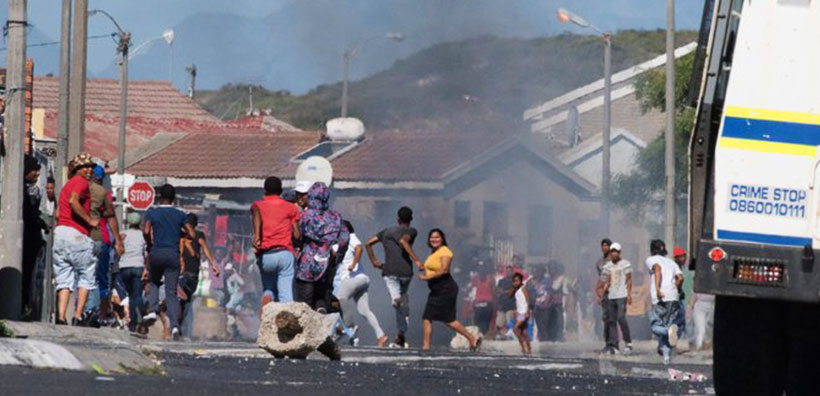By Humairaa Mayet
As South Africa reaches the end of the third week of its five-week lockdown in an attempt to slow the spread of the coronavirus, civil unrest is beginning to spike in impoverished communities. A protest took place in Mitchells Plain yesterday as hungry residents took to the streets demanding food. This protest was preceded by looting around the Cape, and it is likely that the entire country will soon be facing a similar situation.
Social activist, Roegshanda Pascoe, spoke to Salaamedia’s Azhar Vadi about the Cape Town food riots. This began with people breaking into bottle stores, said Pascoe. “The government failed to take into account the severe effects of alcohol and drug withdrawal,” she claimed.
“Now, 20 days into the lockdown, people are breaking into grocery shops because they are starving. While hunger is the key driving factor, the criminal element must not be overlooked.” People are looting spaza shops belonging to informal traders, and have not yet targeted big corporations.
“The reality is that millions of people are going hungry,” stated Pascoe. Thus far, food kitchens have been implemented in the Cape Flats and these have helped many of the individuals who live there. “There are 10-14 people living in a one-bedroom flat with limited amenities, and children are often on the street because of their cramped living situations.”
The government offers no financial contribution to neither the food parcel nor the kitchen schemes, and community activists rely on private donations. Pascoe called for assistance and contributions from private individuals and corporations as the community attempts to keep these efforts afloat.
Shaheed Mahomed offered a broader political background regarding the Cape Town food riots on The Alternative View this morning.
“This is a systemic issue,” said Mahomed, “and there is no scarcity of food – big corporations simply choose to dump their excess, slightly damaged or expired food instead of donating it to the public.” Accordingly, Mahomed claims that “one-third of all food produced in the country is dumped”. This is corroborated by the World Wildlife Foundation (WWF) and the United Nations (UN), as per a study conducted illustrating that one-third of all food in the world is wasted.
“When the State of Disaster was implemented, the Competition Act was given exemption. This means that retailers are now allowed to collude freely and fix prices, and, by doing so, increase their profits.”
“If the government were to distribute food to its citizens, retailers would be forced to lower their prices, thus decreasing their profit margins. In this lockdown, however, the government is not seeing to the needs of the masses; the government is seeing to the needs of large companies,” Mahomed claims.
Mahomed stressed the need for the government to put an end to food dumping by major retailers, particularly in the current circumstances. “If these corporations donate even one-third of what they dispose to starving South Africans, they would not even incur an extra cost. These retailers budget for dumping before it even begins.”
Mahomed emphasized: “We can only survive this if we stand together.”
Listen to the full discussion here:
Featured image from ZimLive via Google.
